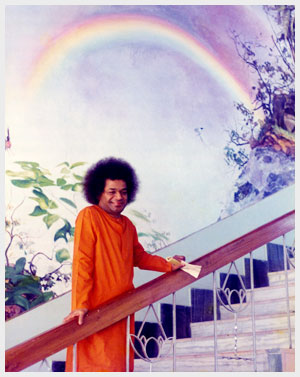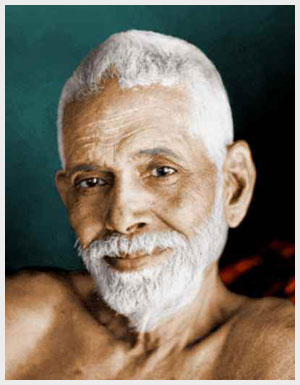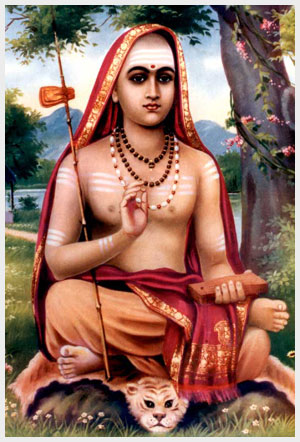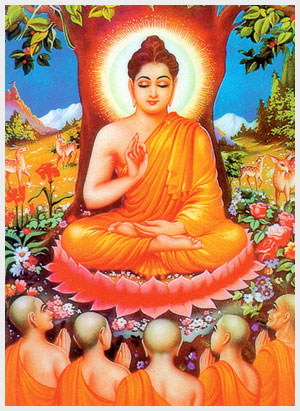 |
 |
 |
| Volume
3 - Issue 8 AUG 2005 |
ADVAITHA DARSHANAM GYANAM
The Gyani (or the Man of Wisdom) The Gyani, with this non-dualistic vision, reposes in the state of Being. He symbolises Being, Awareness and Bliss of the Atman (B-A-B-A). We use the term “Gyani”, generally referring to a man of wisdom, in several ways, and with different connotations, which do not truly convey the grandeur and the glory of the exalted one, who has realized the state of Non-Dualism or Advaitha (also called Monism). For, it is only when one has the realization of the Atman, “the One without a Second” that one can be truly termed a Gyani and a sage. It is quite difficult to express in words, this pure non-dualistic state, which is beyond words, nay, beyond sound itself. It is in the Nirvikalpa Samadhi, the highest level of Samadhi (state of divine merger), that such a one, reposes, and symbolizes, true “Love” as spoken about by Swami. Studying the mango is not the same as eating and enjoying it. Or, like “showing a pebble and saying, a mountain is million times its size” does not really convey the true vision of the mountain. One way of arriving at a humble understanding in some measure, is, to study what our Swami, as well as other great Masters of Monism, have to say. Ways To Achieve Non-Dualistic State 1. The Ramana Way Sri Ramana Maharishi, the great Gyani and seer of modern times, asked every seeker who came to him, to probe into the “Who Am I?” Our Swami puts this one basic question, in the form of 3 questions, for the benefit of the novice. Swami says “A Gyani is one who has found the answer to the 3 basic questions: “Where do I come from?, Who Am I? and Where do I go?”- The answer also Swami provides for our benefit: “I come from the Atman! I am the Atman! and, I go back to the Atman!”. “The Atman”, Swami says -“is One”, and therefore going and coming of the Atman does not arise! Swami says, this is the Absolute Being or Existence, the Non- dual state, not bound by time, space, cause and effect - The Satchitananda. This, then is the Blissful state of a true Gyani. Swami says Love is God. This Love is none other than the Satchitananda nature of the Atman. 2. See Sai in All – The Easiest Way Baba says “Brahman is Satchitananda while Maya is Satchitananda plus Name and Form (Nama-Rupa).” The Advaithist rises above this limitation of Name and Form, (caused by sense attachments) to realize the pure Satchitananda aspect i.e. the Brahman. One way to overcome this limitation caused by Name and Form, is for the seeker, (in this case, the devotee) to try and visualize Swami’s name and form in all that he perceives, as all names and forms finally merge in Swami. Swami being the Master of Maya and hence, of all names and forms. This way the senses are purified, controlled and sublimated. (Presence of the Avataar amidst us, elevates us profoundly, towards this realization).
The great master of Non-dualistic philosophy, seer and yogi, Adi Shankaracharya, states - “Brahma Sathyam, Jagat Mithya -Jeevo Brahmaiva Na Paraha” - i.e. “Brahman is Truth, the world is an Illusion.” And that “The Jiva (or the individual) is not different from Brahman”. This appears, contradictory to the views of the worldly man. For, the worldly man believes this world to be very real and the truth and God, appears to him as an imagination of fertile minds! The worldly man therefore clings to duality and the world of senses, which is of temporary and transient nature. As Shankara states “When Truth is known, where then is this world (of duality)? The question is:- if the Atman (or Brahman), is one without a second and It is all pervading, etc, the individual by itself would have no standing! But this is not the fact, as Shankara’s explains further that :- the Jiva is not different from Brahman, provided it has shed its self-imposed limitations, attachments, illusory presumptions, prejudices, predilections, the transient individuality, ego, and negative thoughts. And thereby he develops Purity of the Intellect and the Mind, before he realises, through Divine Grace, the non-dual state of Advaitha, which is the Jiva’s true and eternal nature. Swami sometimes mentions that He is the ‘Chitha-Chora’, i.e., the stealer of such pure minds and hearts! Man’s Empty Fear This individuality is the great Maya or Illusion, to which man clings (consciously or unconsciously), while vending his way towards Truth through the process of self-purification. It is important to emphasize here that, the seeker, if not advanced or mature spiritually, will be afraid to lose his identity, and thus fail to plumb the very depths of his soul. For Example, observing the ‘not-this’, ‘not-this’ principle, of ‘I am not the body’, ‘I am not the mind’, etc. with the fearful thought and imagination of becoming “void” or “nothingness” (which is really a spiritual state of Being, Bliss and all that is glorious). This basic fear of man towards dissolution of ego, is what makes him cling to duality and hence ignorance. Man is bound basically by (not one), but eight types of pride and ego, says Swami. The ego, on its part is therefore very tricky. Along with the connivance of the mind, they enact and play a thousand tricks, to keep themselves alive, and the individual succumbs to these tricks, in moments of weakness and inadvertence. For, the ego wants to keep itself alive. Death of the ego, is nothing short of Liberation/Immortality. This is what is meant when Swami’s says, “Love is selflessness.” Service – A Powerful Tool Service as spiritual practice is a very powerful tool, but this should result in purification of the mind and the intellect, and there has to be the erasement of the sense of doership on the part of the Jiva. “The one who serves, the one who is served and the act of serving - should become One,” for complete fulfillment, or freedom from illusion. This way, the individual enters the final state of Consciousness (or Samadhi where there is perfect equanimity and perfect peace). The Perpetual Enquiry The individual seeker, therefore needs to question at every stage - “Who is it that enjoys?”, “Who is it that suffers?”, “Who is it that serves?,” etc. This is the inner quest and the constant enquiry that has to be done perpetually and persistently by the seeker. As Maharaj puts it “Liberation is not of the individual - but from the individual!” The Buddha has declared “The Buddha is not a person, but a principle!” The Path of Wisdom – Not for the Weak The individual is perpetually caught in the vicious cycle of birth and death, ignorance, dualities like joy-sorrow, good-bad, etc, and falls a prey to the vicissitudes of life. Buddha’s statement “Sarvam Dukham, Sarvam Kshanikam, Sarvam Anathmam” (meaning, all is temporary, full of sorrow and far for reality), applies totally in its state of bondage. To dive deep within, overcoming these obstacles, (which are basically illusory in nature), and to arrive at the Truth, constitutes spiritual practice of the Gyana yogi (Spiritual aspirant on the path of wisdom), which is otherwise not possible for one who is “afraid.” (Due to negative forces like body -consciousness, worldly desires and attachments, Swami says the path of devotion is easier, though slower). This only shows what great treasures are in store for one who is not afraid - for “This Atman cannot be realized by the weak” but by the brave, is the true scriptural statement. It takes great courage on the part of the sincere seeker, (a courage that comes only with positive qualities of deep devotion, faith, selfless action, surrender, self-introspection, and self-purification), to delve deep within, in order to arrive at the Truth. As Swami says, “the winds of Grace are ever flowing, but the boat sails need to be unfurled”. One great quality of the man of wisdom therefore, is his state of utter fearlessness. My Story is to make you ‘Storyless’ Let me end with Swami’s glowing, parting words - “I bring you close to Me, so that your thoughts and mind are centered around Me, and your story becomes My Story!-- but My Story is to make you-- Storyless!” This is the glorious ideal of the state of oneness, the vision of the non-duality, which every individual has to someday or the other finally realize, through Divine Grace! - S Suresh Rao
|
| Optimized for Netscape and Firefox. Best viewed in Internet Explorer - 1024 x 768 resolution. |
 Our Swami, Sri Sathya Sai Baba, often declares “Advaitha Darshanam Gyanam” meaning, the vision of non-duality is the highest wisdom. We shall now try to elaborate upon its significance, and gain some precious insight into this profound proclamation. The ancient seers, sages and rishis of the upanishadic times, like Yajnyavalkya, Astavakra, Vashistha, Gaudapada, etc., were all such men of highest wisdom.
Our Swami, Sri Sathya Sai Baba, often declares “Advaitha Darshanam Gyanam” meaning, the vision of non-duality is the highest wisdom. We shall now try to elaborate upon its significance, and gain some precious insight into this profound proclamation. The ancient seers, sages and rishis of the upanishadic times, like Yajnyavalkya, Astavakra, Vashistha, Gaudapada, etc., were all such men of highest wisdom. principle. The process of negation, of “Not This-Not this” (Neti-Neti) principle, is the direct approach in Gyana Yoga, and the individual discards all that is ephemeral, transient and changing (illusory), by realizing that he is not the body, the mind, the organs, etc., to arrive at the eternal Truth.
principle. The process of negation, of “Not This-Not this” (Neti-Neti) principle, is the direct approach in Gyana Yoga, and the individual discards all that is ephemeral, transient and changing (illusory), by realizing that he is not the body, the mind, the organs, etc., to arrive at the eternal Truth. Adi Shankara on Non-Dualism
Adi Shankara on Non-Dualism